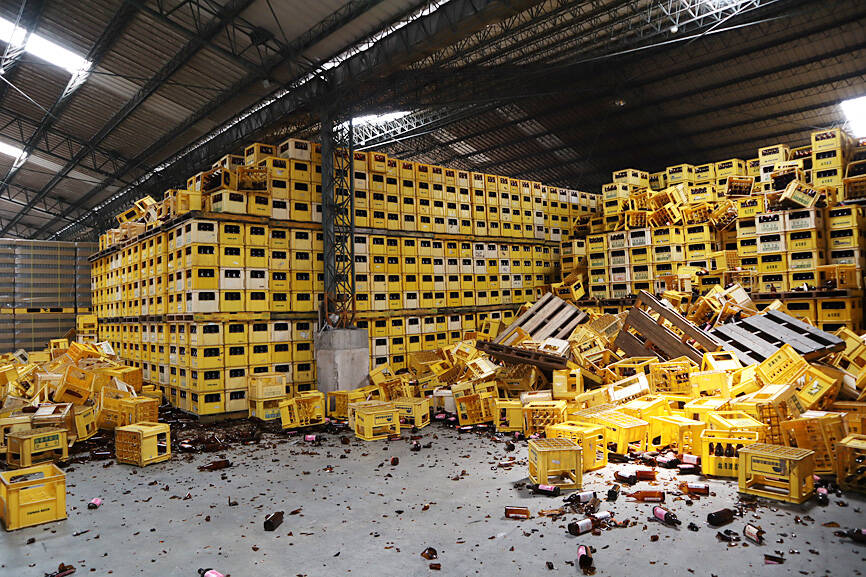Workers at state-run Taiwan Tobacco and Liquor Corp’s (TTL) Hualien Distillery have begun to clean up nearly 200,000 bottles of alcohol that were destroyed during last week’s massive quake.
The Hualien facility mainly produces rice wine, along with smaller quantities of craft-style beer and a series of liquors containing real gold flakes, distillery head Wang Cheng-li (王正利) said yesterday.
During the quake, which measured 7.2 on the Richter scale and magnitude 7.4 on the moment magnitude scale on Wednesday last week, more than 16,000 12-bottle packs of various types of alcohol — or 192,000 bottles — were shattered, causing financial losses of at least NT$14 million (US$436,205), Wang said.

Photo: CNA
“And that’s only a rough estimate, because a lot of the alcohol is stacked together [in storage], and we haven’t been able to take a detailed inventory,” he added.
The clean-up had only started in the last day or two, due to initial concerns about the higher-proof spirits sparking an explosion, he said.
Compared with Wednesday’s quake, Wang said a magnitude 6.4 quake that struck Hualien on Feb. 6, 2018, seemed to shake even more violently.
Still, it would take “at least a week” before the distillery is cleaned up and able to resume production, he said.
While the distillery’s production lines were damaged in the earthquake, the worst-hit part of the facility was its storage warehouse, which remains littered with broken glass bottles, cracked aging vats, and pools of various types of alcohol.
“That’s 30-year-old Shaoxing wine with the darker color,” Wang said, pointing to stream-like stains running along one of the building’s outer walls.
After the 2018 earthquake, the distillery installed protective measures, such as netting in its storage areas, he said.
While those changes failed to prevent extensive losses last week, the situation would likely have been even worse without them, deputy distillery head Chien Kai-wei (簡凱偉) said.
“Six years ago, we lost more than 10,000 vats of Shaoxing wine, and we reduced that to about 1,000 vats this time,” he said.

Rain is to increase from Wednesday morning as Severe Tropical Storm Kong-Rey approaches, with sea warnings to be issued as early as tomorrow afternoon, the Central Weather Administration (CWA) said today. As of 8am, Kong-Rey was 1,050km east-southeast of the Hengchun Peninsula (恆春) heading in a northwesterly direction toward Taiwan, CWA Forecast Center Director Lin Po-tung (林伯東) said. Rainfall is to increase from Wednesday morning, especially in northern Taiwan and Yilan County, he said. A sea warning is possible from tomorrow afternoon, while a land warning may be issued on Wednesday morning, he added. Kong-Rey may intensify into a moderate typhoon as it passes

Taiwan yesterday issued warnings to four Chinese coast guard vessels that intruded into restricted waters around the Taiwan-controlled Kinmen Islands, according to the Coast Guard Administration (CGA). The four China Coast Guard ships were detected approaching restricted waters south of Kinmen at around 2 pm yesterday, the CGA’s Kinmen-Matsu Branch said in a statement. The CGA said it immediately deployed four patrol boats to closely monitor the situation. When the Chinese ships with the hull numbers "14512," "14609," "14603" and "14602" separately entered the restricted waters off Fuhsing islet (復興嶼), Zhaishan (翟山), Sinhu (新湖) and Liaoluo (料羅) at 3 pm, the Taiwanese patrol

A former member of the US Naval Special Warfare Development Group (DEVGRU), formerly known as SEAL Team 6, said in an interview with Business Insider that the elite unit’s role in a Taiwan Strait conflict would be more limited than some might expect. The report follows an earlier one in September by the Financial Times, which said the “clandestine US Navy commando unit” has been training for missions to help Taiwan if it is invaded by China. “You don’t use a scalpel for a job a hammer can do,” the former Navy Seal said to Business Insider on condition of anonymity.

MUCH-NEEDED: After China demonstrated its capabilities to deploy vertical launching systems, Taiwan needs air defense systems such as NASAMS, a defense expert said The US’ approval of exports of three advanced air defense missile systems to Taiwan signified NATO’s goodwill toward the nation, a Taiwanese defense expert said. The US Defense Security Cooperation Agency on Friday announced the US$1.16 billion sale of the National Advanced Surface-to-Air Missile System (NASAMS) and the US$828 million sale of AN/TPS-77 and AN/TPS-78 radar turnkey systems. The NASAMS is a network that uses ground-launched Air Intercept Missile (AIM)-120 Advanced Medium-Range Air-to-Air Missiles (AMRAAM) to intercept hostile aircraft, drones and cruise missiles. Su Tzu-yun (蘇紫雲), director of defense strategy and resources at the state-funded Institute for National Defense and Security Research, said